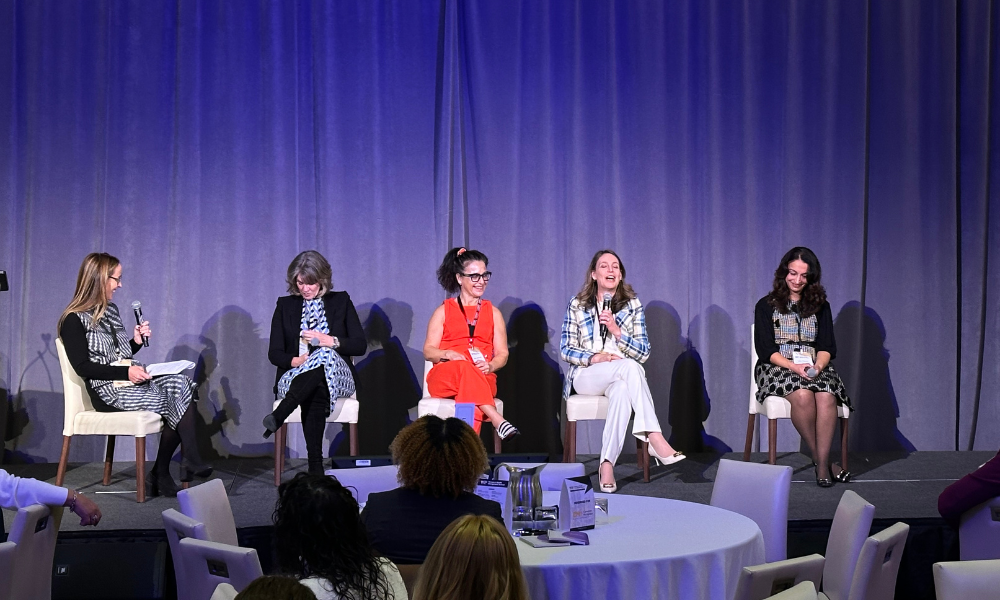At the 2024 Wealth Professional Women in Wealth Management Summit, industry leaders confront gaps, champion progress, and chart a course for a more inclusive future

The Women in Wealth Management Summit Canada 2024 opened with a powerful statement from keynote speaker Melissa Leong, personal finance expert and best-selling author: “When women know wealth and empower others to do the same, it becomes an unstoppable act of social justice.” Now in its seventh year, the summit brought together professionals across the financial services sector to address critical gaps, celebrate progress, and map out strategies for a more inclusive future.
The day’s events opened with a sharp focus from Sarah Bull, partner and portfolio manager at KJ Harrison, on a persistent imbalance in the financial services industry: while women comprise just 15% of financial advisors in Canada, 70% of women investors say they prefer to work with female advisors. This disconnect represents both a challenge and an opportunity in an industry on the cusp of transformation.
By 2030, Bull pointed out, women are expected to control two-thirds of global private wealth. In Canada alone, women are projected to manage over $4 trillion by 2028, nearly double the $2.2 trillion held in 2023. Yet a significant confidence gap remains. Bull highlighted studies show that only one in four women feel prepared to manage their finances if they outlive their partner. These statistics tell a compelling story: as financial power shifts, the industry must adapt to better serve women and meet the growing demand for female financial advisors.
Money, stress, and the human side of wealth
Leong’s keynote shifted the narrative around wealth, emphasizing the emotional and psychological dimensions of financial decision-making. She challenged attendees to rethink traditional views on money, noting, “People assume that personal finance is all about logic and numbers. But science tells us that most financial decisions are driven by intuition, emotion, and stress.”
This stress, Leong explained, often prevents people from acting in their own best interests. Research consistently identifies money as the leading source of stress for individuals and couples, and this stress can override the brain’s ability to make rational, long-term decisions. “When we’re overwhelmed, our prefrontal cortex—the part of the brain responsible for planning—shuts down. We focus on immediate relief instead of future goals,” she said.
She described this as a “vortex of stress,” where poor financial choices lead to further anxiety, perpetuating a harmful cycle. “People use money to alleviate pain, whether it’s late-night online shopping to feel in control or overspending to escape discomfort,” Leong explained. Her message to wealth advisors: help clients take the shame out of financial discussions and approach money as a tool for building a fulfilling life rather than a source of fear or frustration.
Her talk culminated in a reflective exercise where attendees envisioned their future selves, underscoring the long-term impact of the financial decisions made today. This exercise emphasized the industry’s broader responsibility: to help clients connect their financial goals with their personal aspirations.
Mentorship and resilience
The panel, Empowering women in finance: Continuing to prioritize the important conversations brought together seasoned leaders in the industry, including Tammy Buss, Oricia Smith, Kelli Costigan, and Leila Fiouzi; moderated by Sarah Bull.
For Buss, who started her career in the 1980s, the road was often uphill. Faced with outright bias, she found herself repeatedly underestimated. “I had to prove I belonged in the room,” she said. Early on, she realized that her male counterparts could succeed without credentials, but she needed designations behind her name to be taken seriously. When those challenges persisted, Buss decided to carve her own path, building an independent practice that not only thrived but became a platform for mentoring other women.
This emphasis on community and mentorship was echoed by Costigan, who credits much of her success to the networks she built throughout her career. “I thought I had great ideas, and I wanted to grow in my role,” she said. “But that growth didn’t come from arrogance or aggression. It came from finding people who believed in me, supporting them in return, and focusing on mutual success.”
Costigan’s advice for those entering the field: seek out environments that value diversity and foster collaboration. “The culture of an organization matters,” she said, adding that a commitment to inclusion and support creates not only stronger teams but better outcomes for clients. Her approach has always been to “pay it forward,” ensuring that others have the same opportunities she worked so hard to create for herself.
Creating an inclusive culture in wealth management
Fiouzi, Senior Investment Counsellor at RBC, brought a different perspective to the discussion. As a first-generation immigrant to Canada, she often felt like an outsider, both culturally and professionally. Yet she turned what might have been a disadvantage into a strength. “Not growing up with financial knowledge at the dinner table meant I had to learn everything from scratch,” she said. “That freed me to challenge traditional ideas and approach problems with fresh eyes.”
Fiouzi, like her fellow panelists, stressed the importance of pushing past negativity. Whether it was ignoring dismissive colleagues or sidestepping unproductive “water cooler talk,” she focused on aligning herself with those who lifted her up.
Oricia Smith, President of Sun Life Global Investments, highlighted how structural changes can create real opportunities. “Succession planning is critical,” she said. “I’m in this role today because someone put me on a succession plan. Now, it’s our responsibility to ensure we’re doing the same for the next generation.”
Smith also underscored the importance of aligning organizational goals with client needs. “At Sun Life, we talk about what matters most to clients—not just their wealth but their well-being,” she said.
As Leong reminded attendees of the legacy they are building, “We are not just professionals; we are ancestors,” she said. “The choices we make today will shape the opportunities for generations to come.”



